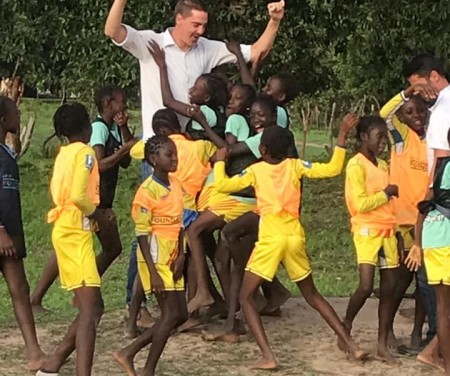Kick For Trade Coaches are positive role models who have been trained to deliver the Kick For Trade Curriculums to young people. Coaches are committed and motivated community members who believe in the power of football to help young people achieve brighter futures for themselves and their community. They are trained to deliver high-quality sessions, to speak the Kick For Trade ‘language’ and to motivate young people through sessions both on and off the pitch!
What are the activities and responsibilities of a Kick For Trade Coach? Specific responsibilities of a Kick For Trade Coach will vary depending on a number of factors including the different partner organizations involved and the timing of delivery. However, over time all coaches will be involved in the following duties: Attending and completing required coach training programs, including initial training and refresher courses. Identifying and mobilising participants from their local community take part in the curriculums. This may include accompanying program managers to meetings with schools and community projects to promote interest and encourage young people to get involved. Delivering high quality curriculum sessions to groups of young people over a specified time period e.g. one sessions per week over three months. This is the most fundamental and important role of a coach! Taking care of coach equipment and wearing provided Kick For Trade apparel for all interventions. Capturing and recording data as required to help monitor and evaluate the effectiveness of the interventions including recording attendance, completing coach observations forms and conducting and pre and post test questionnaires as required. Communicating effectively with program managers and attending coach meetings. Good communication, feedback and ideas are essential to ensure the effectiveness of the project and to keep improving content and delivery. Being willing to provide constructive feedback to other coaches and team. Members, as well as being willing to listen to others who have feedback and suggestions for you. Acting professionally at all times and maintaining standards of behaviour both inside and outside of Kick For Trade sessions that inspire and motivate young people to replicate and adopt positive behaviours. What attributes will a Kick For Trade coach have? 1. Positive attitude! A positive attitude rubs off on other people and will lead to a motivated and engaged group of participants. 2. Leadership. Able to manage a group, be in control and inspire others. Coaches should be able to manage a group of young people in order for the sessions to run smoothly. Coaches need to be heard and this will only happen if the group is participating under the control of the coach. This does not mean shouting angrily but making sure participants know when to it is time to listen. This includes being able to manage any disruptive elements. 3. Confident (but not arrogant). Confidence will help you to keep control and gain the respect of the group. Confidence is not arrogance – the session is not for the coach to show off, but to empower all members of the group to have the confidence to participate. 4. Good timekeeping. Good timekeeping is a key quality. Sessions need to run to time, as well as allowing flexibility for important discussions to continue where necessary. 5. Fun! (with the right balance) The coaches will be able to ensure the sessions are enjoyable for the participants. If participants are bored they are unlikely to be engaged. At the same time, coaches will be able to communicate important messages and achieve the right balance, addressing serious topics and having in-depth discussions where appropriate. 6. Good listening skills. The coach is not an actor on a stage. Instead the stars are the participants and the role of the coach is to listen and facilitate. The coach should be able to bounce questions from participants back to other participants. The coach should be talking no more than 10% of the time. 7. Well organized and prepared. Knowing the sessions and being ready to deliver is vital. Coaches should have good organizational skills and attention to detail. 8. Neutral approach. The coach should be able to avoid imposing their personal views on the group and allow a neutral approach that promotes the generic values of the curriculum. 9. Good communication skills. These are critical. The coach is a communicator and should be able to get key information across to participants. This includes being able to explain how activities work and what is expected. Verbal communication and body language are both important. 10.Honest and consistent. Coaches must be prepared to speak honestly about their own experiences. This will show empathy and will help the participants to have the confidence to participate fully themselves. The coach should also be able to ensure consistency in messaging and in how participants are treated. 11.Sensitivity. The coach should have awareness of how participants might feel, especially when working with young people from vulnerable backgrounds. They should be aware that all participants are different and may need support and encouragement to participate. They should also be aware of the issues that young people face in their communities. 12.Role model. Overall the coach is a role model. How they behave will have a huge impact on how the participants respond to the curriculum. Therefore coaches should be selected carefully to ensure they possess the qualities listed above.
